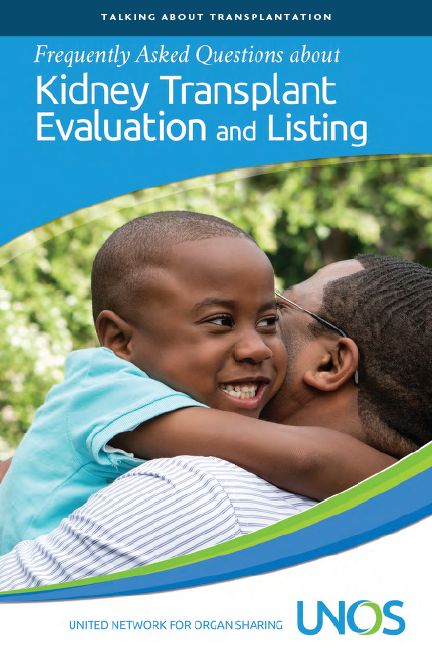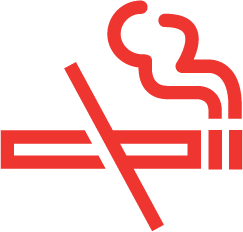Transplant from a donor who has died
Getting the transplant process started
How do I start the transplant process?
You can get a kidney transplant when either:
- Your kidneys do 20% or less of the work of 2 working kidneys
- You start dialysis
 UNOS offers a booklet called ‘Frequently Asked Questions about Kidney Transplant Evaluation and Listing.’ This booklet has all of the steps and information about how to start the transplant evaluation process.
UNOS offers a booklet called ‘Frequently Asked Questions about Kidney Transplant Evaluation and Listing.’ This booklet has all of the steps and information about how to start the transplant evaluation process.
Download a copy of the booklet.
Transplant evaluation
Watch this video about the transplant evaluation process.
Your transplant center will help you set up all of this and walk you through the process. This is just to give you an idea of what you might need.
- Contact the transplant center and ask to start the process. You may need your doctor to refer you, or you may be able to call the transplant center yourself. It depends where you live. The transplant center will let you know if you need your doctor to refer you.
- Fill out the medical forms they send in the mail
- Schedule an appointment with the transplant team to start a medical, psychological, and financial interview – this means the center will want to know about your health, your mental or emotional health, and how much money you make and have saved.
Medical tests and doctor appointments

These tests are to see if you’re healthy enough for surgery and if your transplant is likely to work. You can get these tests at your primary doctor or at the transplant center. The transplant teams may have specific doctors they want to do your testing. This may mean that the center won’t use your primary doctor’s tests in their decision to accept you.
These tests can take months to a year, and need to be finished before surgery. Doctors will treat any major medical problems before the transplant surgery. They will do some or all of these tests:
Every visit
- Blood pressure – to see if your heart and arteries are healthy
Monthly
- Blood sample – to test for your blood type and for antigens in your blood
- Urine sample – to test for infections and other problems
Every 6 months
- Dental check – to make sure there are no infections in your gums and teeth
Yearly
- Chest x-ray – to see if you have any lung problems
- EKG – to look for a healthy heart rate and rhythm
- Echocardiogram – to test how well your heart pumps and how well your heart valves work
- Nuclear stress test – to see if your heart has blockages and pumps well
- Cancer screenings – to look for cancer, especially skin cancer
- VCUG – to see if your urinary tract is normal
- Prostate-specific antigen test – to test for prostate cancer in men over 50 or with a family history of prostate cancer
- Pap smear – if you’re a woman over 18, you’ll need a Pap smear to look for cervical cancer
- Mammography – if you’re a woman over 40 or have a family history of breast cancer, you’ll need a mammogram to look for breast cancer
- Colonoscopy – if you’re over 50 or have a family history of colon cancer, you’ll need to have a colonoscopy to look for colon cancer
If needed
- Cardiology (heart doctor) appointment – if you have a history of heart disease, high blood pressure, or diabetes, or if you have abnormal heart tests, you’ll see a heart doctor to decide if surgery is safe for you
Nicotine and marijuana

The transplant center may not accept you if you smoke (including medical marijuana) or have a drug or alcohol problem. Smoking, drinking, and drugs can cause health problems during transplant. If you’re tested and results show you have nicotine or drugs in your system, the center is likely to turn you down or tell you to re-apply in about 6 months.
You’ll need to stop smoking before you reapply. This can be hard to do. Talk to your doctor about resources to help you stop. Chewing nicotine gum and other nicotine methods to help you stop smoking show up in your test results as nicotine and can cause a problem. This means you’ll need to use other methods, such as therapy or medicines that don’t contain nicotine.
Leaders in transplant excellence
UNOS works with leading educational partners to provide accurate, trustworthy health information. Our educational partners include:
Special thanks to our corporate sponsor for supporting excellence in transplant education:


